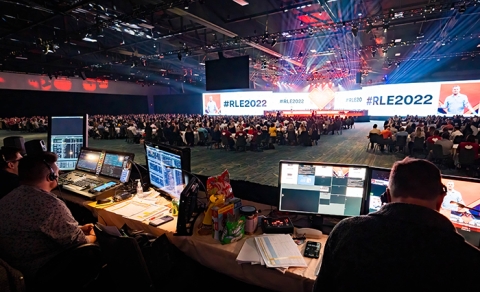Unforgettable Experiences Crafted by Our Premier Event Production Company
Unforgettable Experiences Crafted by Our Premier Event Production Company
Blog Article
The Relevance of Effective Planning in the Process of Occasion Production
Reliable planning offers as the cornerstone of effective event production, establishing an organized framework that promotes success. By verbalizing clear purposes and carefully crafting timelines, organizers can strategically allot resources and determine possible obstacles prior to they show up. This foresight not only boosts communication among stakeholders yet also leads the way for smooth execution. The intricacies of each planning phase expose intricacies that usually challenge even the most skilled experts, increasing the inquiry: what are the essential elements that can make or break the preparation process?
Understanding Event Planning Essentials

This foundational knowledge informs all subsequent planning decisions. A well-structured timeline is important, making certain that every job is finished in a prompt fashion.
Coordination among stakeholders-- including suppliers, enrollers, and group participants-- is another vital element of event planning. By realizing these event preparation basics, organizers can navigate the intricacies of the process, inevitably leading to a remarkable and effective event experience.
Establishing Clear Purposes

To develop effective goals, organizers must employ the SMART criteria-- Specific, Measurable, Achievable, Appropriate, and Time-bound. Possible goals make sure that the goals are attainable and realistic within the given constraints, while relevant goals straighten with the more comprehensive mission of the company.
Entailing vital stakeholders in the objective-setting procedure cultivates cooperation and makes certain that varied perspectives are thought about. This incorporation improves buy-in and commitment from all events entailed. In addition, clearly expressed objectives assist in interaction and liability throughout the preparation phases, inevitably resulting in an extra successful event (Event Production Company). By prioritizing the establishment of clear objectives, occasion organizers lay a strong structure for efficient implementation and examination of their efforts.
Budgeting and Resource Allotment
Effective budgeting and resource appropriation are vital components of successful event planning, as they straight affect the expediency and high quality of the event. A well-structured spending plan works as a roadmap, guiding decision-making and guaranteeing that sources are used effectively. It is important to determine all possible prices upfront, including venue leasing, catering, amusement, marketing, and staffing, to produce a comprehensive economic strategy.

Furthermore, preserving adaptability within the budget is critical. Unpredicted expenses might develop, demanding changes to guarantee that the occasion remains monetarily sensible. Normal tracking and examination of expenditures against the budget plan will certainly assist identify pop over to these guys disparities early, permitting timely rehabilitative activities. Inevitably, efficient budgeting and source allotment lay the structure for an effective event, allowing coordinators to satisfy their goals while making best use of roi.
Timeline Advancement and Management
Producing a comprehensive timeline is important for maintaining event manufacturing on track and making certain that all tasks are completed in a prompt way. A well-structured timeline works as a roadmap, leading the occasion team via each phase of the manufacturing procedure. It delineates important landmarks, due dates, and dependencies, enabling for the efficient allocation of personnel and sources.
To establish an efficient timeline, start by identifying all key parts of the event, consisting of preparation, logistical plans, vendor coordination, and advertising efforts. Break down each element into convenient jobs, appointing liable celebrations and specific target dates. This granular approach assists in liability and helps to identify possible bottlenecks early at the same time.
Regularly reviewing and updating the timeline is essential. As the occasion day approaches, unexpected obstacles might occur, demanding modifications to the strategy. By keeping versatility and fostering open communication among employee, you can make sure that everybody is straightened and familiar with any kind of modifications.
Inevitably, efficient timeline administration not only improves efficiency however also adds to a smooth occasion experience, allowing all stakeholders to focus on providing a successful result. Event Production Company.
Danger Evaluation and Contingency Planning
As the timeline for event manufacturing unfolds, addressing potential threats becomes increasingly essential. Risk evaluation involves determining, analyzing, and focusing on potential dangers that could interfere with the occasion. This positive technique allows event organizers to anticipate challenges-- ranging from negative weather problems to technological failures-- and develop approaches to mitigate their effect.
Contingency preparation is the foundation of reliable risk monitoring (Event Production Company). It involves establishing alternative approaches and activity strategies to be applied need to determined risks appear. As an example, having backup locations, alternate suppliers, or emergency communication protocols in location can dramatically reduce the turmoil often related to unpredicted issues.
Moreover, it is critical to involve all stakeholders throughout the risk evaluation phase. Involving team members, vendors, and venue supervisors promotes a comprehensive understanding of possible vulnerabilities, making sure that backup strategies are well-communicated and durable. Regularly assessing and updating these strategies throughout the event planning procedure is necessary to adjust to any kind of adjustments in situations.
Verdict
In summary, effective preparation acts as the foundation for effective event production. By establishing clear purposes, taking care of budgets, and establishing thorough timelines, planners can maximize resource allotment and improve sychronisation amongst stakeholders. Additionally, extensive risk evaluation and the formula of contingency strategies ensure preparedness for unpredicted challenges. Inevitably, a methodical approach to event explanation planning not just raises the possibility of a seamless implementation but also contributes to a memorable experience for all participants included.
By understanding these event planning basics, coordinators can navigate the complexities of the process, inevitably leading to a memorable and effective occasion experience.
Effective occasion planning hinges on the capability to set clear purposes that guide the whole procedure. Additionally, plainly expressed goals facilitate interaction and accountability throughout the preparation stages, ultimately leading to a more successful event.Effective budgeting and source allotment are important elements of effective occasion planning, as they straight affect the usefulness and high quality of the event.To create visit this site right here an efficient timeline, begin by determining all key components of the event, consisting of preparation, logistical arrangements, supplier sychronisation, and marketing efforts.
Report this page